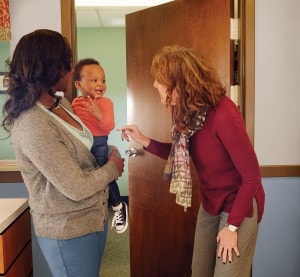On most days, your child bounds into the classroom with nary a backward glance, but lately she’s been having a hard time at drop-off. There are more tears, it seems, and more fears. What’s changed? Is everything okay at school?
you have an inkling of worry, it’s time to talk to your child’s teacher, says Lisa Emmons, KinderCare Education customer service specialist (and former kindergarten teacher and center director). “The more communication you have, the better,” she says. Addressing concerns as they arise gives you and your child’s teacher a chance to share information, get on the same page, and troubleshoot any problems as a team—both at home and at school.
Of course, it’s not always easy to reach out when problems pop up: For many people, these conversations can be hard to have! So Emmons shared with us four real-world concerns she hears frequently—and her expert advice on how to proactively solve them. The secret to success? It all starts with communication.
1. My child was doing great, but now that he’s transitioned to a new classroom, he’s having a few potty accidents a week. Why?
Changes in your kiddo’s potty habits—or his sleeping or eating patterns—can be worrisome when you’re not with him during the day to see what’s going on. Is your little guy just having a hard time? Is the teacher paying attention to his bathroom cues? Or is he so busy playing with his new friends that he just forgot to go to the toilet?
Communication Fix: Contact your center director and ask to set up a 10–15 minute conference with your child’s teacher. Your goal is to understand the behavior changes, share information, and come up ideas to make the transition easier for him. Questions to ask: What do you think is going on? Can you help me understand how and when the accidents are occurring? How can I help at home?
2. My child had a disagreement with her best friend and now her feelings are hurt.
Starting around age 4 or 5, newly developing friendships can sometimes lead to hurt feelings. You may hear about it during the car ride home, when your darling pipes up from the back seat, “Lola was mean and she’s not my friend anymore.” But it can be difficult to get the full story from a kindergartener: Is it something you should worry about or was it just a small disagreement that everyone will forget by tomorrow?
Communication Fix: “If it’s at all concerning to you, speak to your child’s teacher,” suggests Emmons. After all, your child’s teacher observes social interactions among the children all day, and can likely give you a fuller appraisal of the classroom dynamics. Together, you can come up with ways to help your child stand up for herself and confidently express her feelings, at home and at school. She can practice phrases like: I don’t like it when you don’t share the paints. It makes me unhappy when you won’t play with me. I’d like a turn, too.
3. It’s pajama day and nobody told me.
It seems like a small thing, but it can be hard to see your child’s face when she walks into the classroom and realizes that she’s the only one not dressed up. “When it affects our children, it affects us,” says Emmons.
Communication Fix: Talk to your child’s teacher to learn where special school and classroom activities are regularly announced (whether in an email, on a daily sheet, or on the center parent board) so that you can stay informed about upcoming events. Also tell your teacher how best to reach you—if it’s email, make sure that your center has your preferred address. You might even develop your own system for keeping up with communications. “We had one husband who snapped a picture of the parent board every day at pickup, so he and his wife could read it later,” says Emmons.
4. My child was bitten!
Not being there to comfort your little one when he’s hurt—whether he’s been bitten by another child or fell and scraped his knees on the playground—is upsetting for a parent.
Communication Fix: When injuries occur, teachers write up report about the incident to share with you—but if you have more questions or concerns, it’s important to have an additional conversation so you can get the answers you need. Because of privacy concerns, teachers won’t share other children’s names, but they can tell you—in detail—the circumstances of the incident and how they will respond to a similar situation in the future. Question to ask: What are you trying in the classroom? How do the teachers respond to the two children involved following a bite? How do you coach the kids on better ways to express emotions? Can I help my child by doing the same at home?
This post originally appeared here





